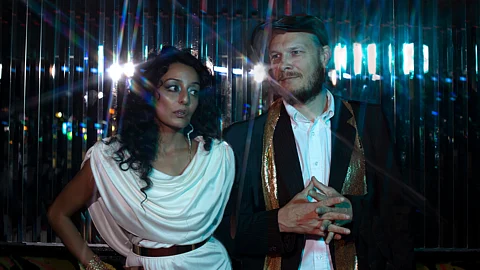
- HOMEGROWN WORLD
- #HGCREATORS
- #HGEXPLORE
- #HGVOICES
- #HGSHOP
- CAREERS
- ABOUT US
- CONTACT US

When Discostan takes over a room, it does more than play music. The diasporic discotheque offers an archival intervention, a transnational prayer, and an unapologetic celebration of lineage. On a summer night in New York City, Discostan will return with its first appearance in the city since 2023, joined by Spoonerism for their first public performance. Together, the two forces are making a case for memory, movement, and the radical possibilities of diasporic imagination.
Discostan began in Los Angeles in 2011, emerging from what its founder Arshia Fatima Haq saw as a gap in how music from the SWANA (South West Asia and North Africa) region was presented. “There were world music nights that were kind of a catch-all for anything that was other, and then there were events that were very specific to a country or genre,” recalls the team at Discostan, which is now co-helmed by Jeremy Loudenback. “But we were interested in creating a space that was culturally, historically and politically grounded in the interconnected narratives of the SWANA region and at the same time thinking outside of the lines of nationalism.”
In its earliest events, Discostan’s sets mixed the exuberance of 1980s film music from Bappi Lahiri, Charanjit Singh, and Nazia Hassan with rarer cuts from Iranian, Afghan, and Arab archives, repositioning these sounds on a new sonic map that countered orientalist simplifications with complexity, joy, and resistance. Beyond a shared vocabulary, there were many recurring themes and musical motifs between the music from different countries that Discostan wanted to highlight in their sets.
Over the years, Discostan has grown into a full-bodied practice. Their language is rooted in history and speculation — threading Iraqi choubi into Bollywood disco, inserting Maghrebi field recordings in peak-time sets, and ending the night with qawwali. “As much as we enjoy classic pop and folk sounds, the Discostan project is not meant to live in the past but to explore the present and possible futures,” they explain. “It also means stitching sounds from different eras together within a set, and thinking of the set as a narrative in the best possible nonlinear way.”
This narrative sensibility of looping time, and merging borders, is also mirrored in their collaborators for the New York show. Founded initially as a management house, Spoonerism has grown into a multi-platform media project supporting artists who “weave together distinct genres from across the globe". Their work includes a monthly radio show, live performances, and a newsletter that mines diasporic sound practices with a hip-hop ethos. “Fusing Brazilian funk with Mexican bolero, or turning the results of diasporic crate-digging into Dilla-indebted hip-hop,” Spoonerism explains, "has become a way to trace how cultural memory travels, fragments, and recomposes.
Their upcoming night at Public Records is a culmination of that kinship — between two collectives, scenes, sounds, and stories. The night’s set will include producers like Ammar 808, Toumba, and DJ Haram, but also less predictable inclusions such as qataghani and bandari and other “sounds that make our dancefloor feel like home.”
The phrase “decolonise the dancefloor” has long been associated with Discostan — though they’re now more cautious with its use. “Cultural conversation around decolonising has shifted since we came up with the phrase in the early days of imagining this space — and it’s a phrase which, like many of Discostan’s aphorisms, is a bit tongue in cheek,” they reflect. “But the spirit of this phrase is inscribed in everything we do, from the words and images we select, the sounds we put in unexpected conversations with each other, to the collaborations we reach towards (and just as importantly, choose not to participate in).”
The work and mission of Discostan and Spoonerism comes from a place of agency. It is proof that cultural work doesn’t need to explain itself through the language of institutions or geopolitics. It can live in sound, in intuition, in the messy entanglements of past and present. And it can often look like a dance floor.
If you enjoyed reading this here's more from Homegrown:
Whether It's Kartik Research Or Sampling History, Lapgan Is Reshaping South Asian Sound
New Delhi Community Radio Is Building A Radical Cross-Cultural South Asian Sound Network
Cavya Sound Is A Studio Highlighting The Multiplicity Of The Tamil Cultural Experience
